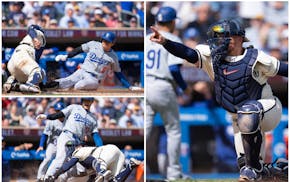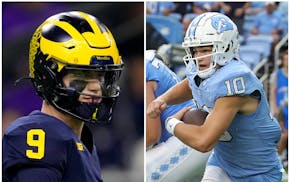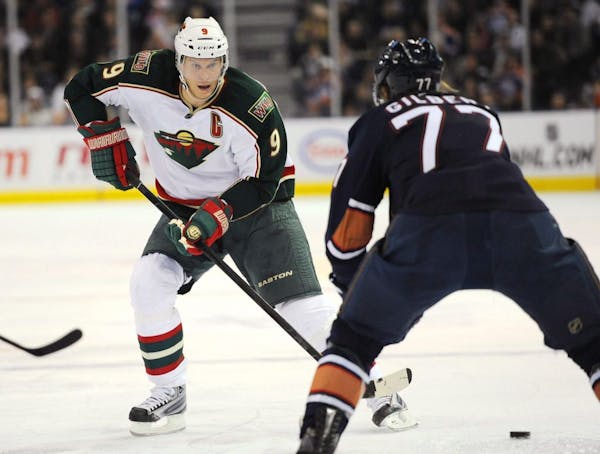The Wild returned home from a long, successful road trip Wednesday with the most points in the NHL. The opponent that night, the Chicago Blackhawks, owned the second-best record in the conference.
Wild officials publicly predicted a sellout, which is why they probably watched nervously at the start as Xcel Energy Center had large pockets of empty seats and as much energy as Siberia.
The place was full and full-throated by the end of the first period, however. Presumably, the latecomers forgot the nationally televised game started 30 minutes earlier than normal. And judging by eyewitness tweets, rush-hour traffic ranked among the worst on human record.
Ultimately, the Wild got its sellout, announced at 19,254, the sixth-largest regular-season crowd in team history. The Wild hopes it's a sign that fans are ready to return to the Xcel Center en masse to support the NHL's surprise team.
"Ticket sales over the past month have mirrored the team's outstanding performance," said Matt Majka, the Wild's chief operating officer. "The building was jampacked for the Blackhawks game, and the games for the foreseeable future are looking much more healthy than the October games did. Having said that, our work is not done. As an organization, we'll continue to work on earning the support of our fans."
A full Xcel Energy Center used to be standard fare for Wild games. Beginning with its inaugural season, the team announced 370 consecutive regular-season sellouts. The streak became a source of organizational pride, highlighted by a special announcement during games.
The sellout streak ended early last season, and attendance has been hit or miss ever since. Wednesday's game marked the third sellout this season. The team announced sellouts in 25 of its 40 home games last season (one game was played in Finland).
The Wild once ranked in the top half of the NHL in home attendance. The team is 17th so far this season, according to ESPN data. At its peak, the Wild sold more than 16,000 season tickets. The team wouldn't confirm its current figure, but it is believed to be approximately 13,000.
Reasons behind the decline aren't difficult to decipher. Fans no longer were content with simply having a cool venue and hockey back in the market. Poor management decisions and three consecutive seasons without a playoff appearance tested their patience and willingness to fork over their cash blindly. The team seemingly escaped the harsh economic realities that affected other professional franchises. Bad, boring hockey eventually caught up with the Wild.
"We have passionate, really committed fans here, but they want and deserve something more on all fronts, not just on the ice," Majka said recently. "Off the ice, we have to be better as well on the business front. They voted last year and we heard them. Now we're in a mode of winning them back and it's starting to come."
The Wild saw a similar uptick last season as all but four of its 25 sellouts came after Christmas. This Wild team certainly is a more attractive draw than any in recent years.
That's because winning is the ultimate driving force for ticket sales. It's not cheap for families to attend professional sporting events, especially in this economy. Fans demand more than just a nice arena. They need to believe in the product, too, or at least feel things are moving in the right direction.
Fans have that now. The Wild hired the right coach in Mike Yeo, who installed an entertaining and aggressive brand of hockey. Management showed a willingness to shake things up by trading for Dany Heatley. The Wild has more talent and better prospects in the farm system. And the organization has an overall plan and vision that makes sense.
The team dissected and analyzed the entire operation, Majka said, hoping to identify ways to improve, including gameday experience. He doesn't believe the Wild necessarily became substandard in that regard, but a team must constantly evolve and stay fresh, even if its building is packed game after game.
"I think after 10 years we needed to take a look in the mirror and make sure that we were not just doing what we always did but continuing to improve," Majka said. "We really challenged ourselves in the past year to reset the bar and to be better.
"Yeah, we want to win hockey games, and that helps for sure. But I do believe we're going to get back to where we were, and I don't think it will take that long, either."
Chip Scoggins • ascoggins@startribune.com

Scoggins: Finch feeling heat of the Suns as playoff battle looms
Scoggins: Why 'championship or bust' fits these Wolves

Scoggins: Anatomy of a game-saving play as Correa throws out Ohtani


